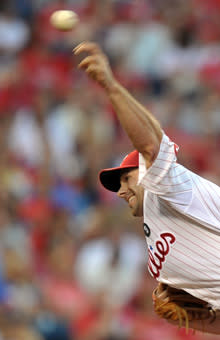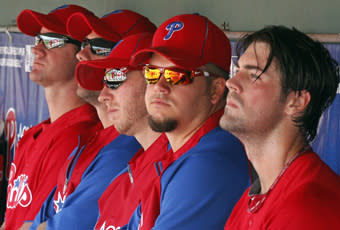Phillies' starters are still the story
On the first day of spring training, five men sat atop a dais so people could gawk at them for 20 minutes. Such productions are normally reserved for the new iPad or red carpets where stars and starlets flash smiles with as much wattage as the flashbulbs popping back at them. These were just five guys with arms kissed by something divine and Philadelphia Phillies uniforms.
The whole thing felt awkward because it was evident Roy Halladay(notes), Joe Blanton(notes), Cliff Lee(notes), Roy Oswalt(notes) and Cole Hamels(notes), sitting left to right, wanted no part of talking about just how great they were before they threw a single pitch together. Halladay was Anton Chigurh, the assassin best left to himself. Blanton wondered what he was doing there. Lee, against type, talked the most. Oswalt, with type, barely said a thing. And Hamels found himself far enough off to the side that he could hide.
As much as they tried to deflect attention, they couldn't. This was supposed to be the best pitching rotation ever, and while best and ever these days bookend things they ought not, this didn't feel like hyperbole. The Phillies had spent $120 million to bring Lee back, and this would be the first time they'd appear together. So he parked himself in the middle and tried to tamp down expectations and cautioned against overstatement.
"We haven't thrown a single pitch as a group yet," Lee said, "so it's a little early to say we're one of the best rotations in the history of the game."
They threw 15,977 pitches as a group this season, the five of them plus Vance Worley(notes) and Kyle Kendrick(notes), who filled in when Blanton and Oswalt were injured. And it's not hyperbolic in the least to now say they're one of the best rotations in the history of the game.
None of that matters, however, not the 2.86 starters' ERA that's the best in a quarter century nor the 102 victories that clinched them home-field advantage for the remainder of the season. Because at its heart, the entire Phillies' experiment will be a failure if this group does not win the World Series.
It's not just the overwhelming talent the Phillies trot out in their rotation. It's their personal history with the postseason. Halladay: ringless. Oswalt: naked fingers. Lee: same, and with two heartbreaks.
"This is the best pitching staff I've seen," Lee said this week. "And usually that's what wins in the playoffs. Considering where we are right now, I like our chances. But the Rangers last year were good, and the Phillies in '09 were good, and I still haven't won one."
The Phillies begin their quest Saturday with their first National League Division Series game against the St. Louis Cardinals, who snuck into the playoffs on the wild final day of the season and may pose the greatest threat in a league through which the Phillies expect to run roughshod. The Cardinals won six of nine games between the two during the regular season and could've wielded the most potent lineup of the four NL contenders.
Then outfielder Matt Holliday(notes) injured a rather apropos body part – the middle finger, raised at the world for waiting until the cusp of the postseason to sideline him – and has been ruled out of Game 1.
Granted, the Cardinals do have Albert Pujols(notes) and Lance Berkman(notes), and Yadier Molina(notes) and Allen Craig(notes) are having under-the-radar excellent seasons, and their starting pitching is serviceable, and their bullpen has stabilized, and … well, they're still not as good as the Phillies. Neither, for that matter, were the San Francisco Giants last season, and they steamrollered the Phillies in the NLCS onto a World Series crown.
[Related: Who's No. 1 in final baseball power rankings?]
It's what makes October baseball so exciting, what allows anyone to crumple up the on-paper teams and see how they translate. The Milwaukee Brewers, after all, match up rather nicely on paper with their three-headed hitting monster of MVP favorite Ryan Braun(notes), playing-for-more-free-agent-money Prince Fielder(notes) and Rickie Weeks(notes), who has sprung up over the last few weeks to rejoin the frightened-by category.
The Brewers have pitching, too. In Game 1 against Arizona, they'll throw Yovani Gallardo(notes), the homegrown product, while Games 2 and 3 will go to Shaun Marcum(notes) and Zack Greinke(notes), two of the tri-aces for whom GM Doug Melvin emptied his farm system in hopes of being here. The strategy worked. Should they vanquish Arizona, the Phillies are heavy favorites to await their arrival.
And yet it's wrong to slough off the Diamondbacks like dandruff on a black shirt. They oppose Gallardo and Marcum with Ian Kennedy(notes) and Daniel Hudson(notes), two equally good, if not better, starters. Even better: The Diamondbacks' offense this season scored 10 more runs than the Brewers' and 18 more than the Phillies' playing in the low-scoring, good-pitching NL West division.
The last time the Diamondbacks made the playoffs with what was considered an iffy roster, they swept the Chicago Cubs in the first round only to run into a Colorado Rockies team that blitzed through seven consecutive wins in the NL postseason.
It's not far-fetched to think this Phillies team is built to do the same. Yes, there are question marks. The lineup. The defense. The bullpen. Everything, really, except the rotation, which will start Halladay, Lee and Hamels in the first three games. Nothing fancy. No hotshot rookie like Tampa Bay is using for its Game 1. No cobbling together a rotation like the New York Yankees have all year long. Just baseball. Playing catch and joking and staying loose and trying not to remember how very devastating a loss feels.
"A lot of us are at the point in our career where you feel like the biggest thing left to do is win a championship," Halladay said in the spring. "That was my goal going into last year: to win the World Series. Coming close and coming up short is definitely hard. It's disappointing. You have your heart set on that all year."
It's Lee's heart, too, that drove him back to Philadelphia instead of the Rangers or Yankees. Not only did it feel right, he sensed – and said – his best opportunity to win a championship wasn't with the defending AL champions or the team whom Lee helped eliminate last season.
"It turned out right," Lee said. "Every option is going to be in the playoffs, so I don't think it would've gone bad elsewhere. All of them were good options. There wasn't going to be a mistake. But I felt like this was my best chance to win, and I still think it is."
Save for an extra-long post-clinch hangover, the Phillies played remarkably well for the season's entirety and will enter October inspiring the same sorts of emotions they did at the February press conference: a dash of awe, no hint of surprise and workmen acting workmanlike.
"We've won the whole season. So far," Lee said. "But our ultimate goal is to win the World Series. Until that happens, I can't say this has been a success."
Nor will anyone else associated with the Phillies. When a team's payroll exceeds $170 million, mere playoff appearances don't cut it. They expect more. Big, fat rings with silly diamonds and memories of winning and drama and excitement.
Something totally divine.
Other popular stories on Yahoo! Sports:
• More than luck behind Evan Longoria's historic homer
• Red Sox cut ties with Terry Francona
• Biggest NBA stars are underpaid


